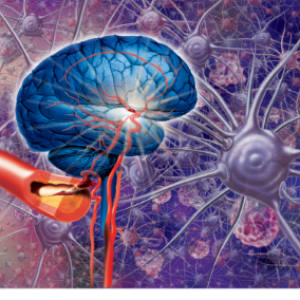Your brain has a rich network of blood vessels—one of the richest in the body. As a result, your brain is particularly vulnerable to any situation that could cause it inadequate blood flow. When you think of a situation that causes inadequate blood flow to the brain, you probably think of a stroke. Vascular dementia causes changes in thinking and memory following a stroke that blocked blood flow to one of the major blood vessels to the brain.
Vascular dementia accounts for about 10 percent of dementia cases and is the second leading cause of dementia behind Alzheimer’s disease, but it’s also underdiagnosed. Here’s what you need to know about vascular dementia.
Vascular Dementia Symptoms Vary Widely
You or someone you know may not experience memory loss. Symptoms depend on the blood vessel and part of the brain affected and are often most obvious after a major stroke. If someone has recently had a major stroke, look for changes like:
- Confusion
- Vision loss
- Disorentiation
- Trouble understanding speech or trouble speaking
These symptoms may also appear at the same time as classic stroke symptoms.
Brain Damage Can Occur Even Without a Major Stroke
Damage can happen after multiple small strokes or from any condition that affects the blood vessels of the brain. Symptoms from these events are less obvious than symptoms following a major stroke because damage accumulates over time. They can include:
- Impaired judgment or planning
- Reduced ability to pay attention
- Uncontrollable laughing or crying
- Difficulty functioning in social situations
- Difficulty finding the right words
Vascular Dementia Is Progressive
Vascular dementia, like Alzheimer’s disease, is progressive, eventually leading the sufferer to lose the ability to do day-to-day activities. Unlike Alzheimer’s patients, vascular dementia patients are more likely to be apathetic, withdrawn and uninterested in activities.
Risk of Vascular Dementia Increases With Age
Like Alzheimer’s disease, your risk for developing vascular dementia increases the older you get. Most people who develop the disease begin experiencing symptoms after age 65. Your risk substantially increases if you are in your 80s or 90s.
You Can Lower Your Risk of Vascular Dementia
The risk factors for developing vascular dementia are the same as those that increase your risk for stroke or heart attack. The same steps you take to reduce these conditions are useful in decreasing the risk for vascular dementia. They are:
- Not smoking
- Keeping your blood pressure, blood sugar and cholesterol within normal ranges
- Exercising and maintaining a healthy weight
- Watching your alcohol consumption
Healthy habits can reduce your risk for vascular dementia, protect your brain health and reduce your risks for heart attack and stroke. If you have concerns about stroke or vascular dementia symptoms, talk to your doctor.











